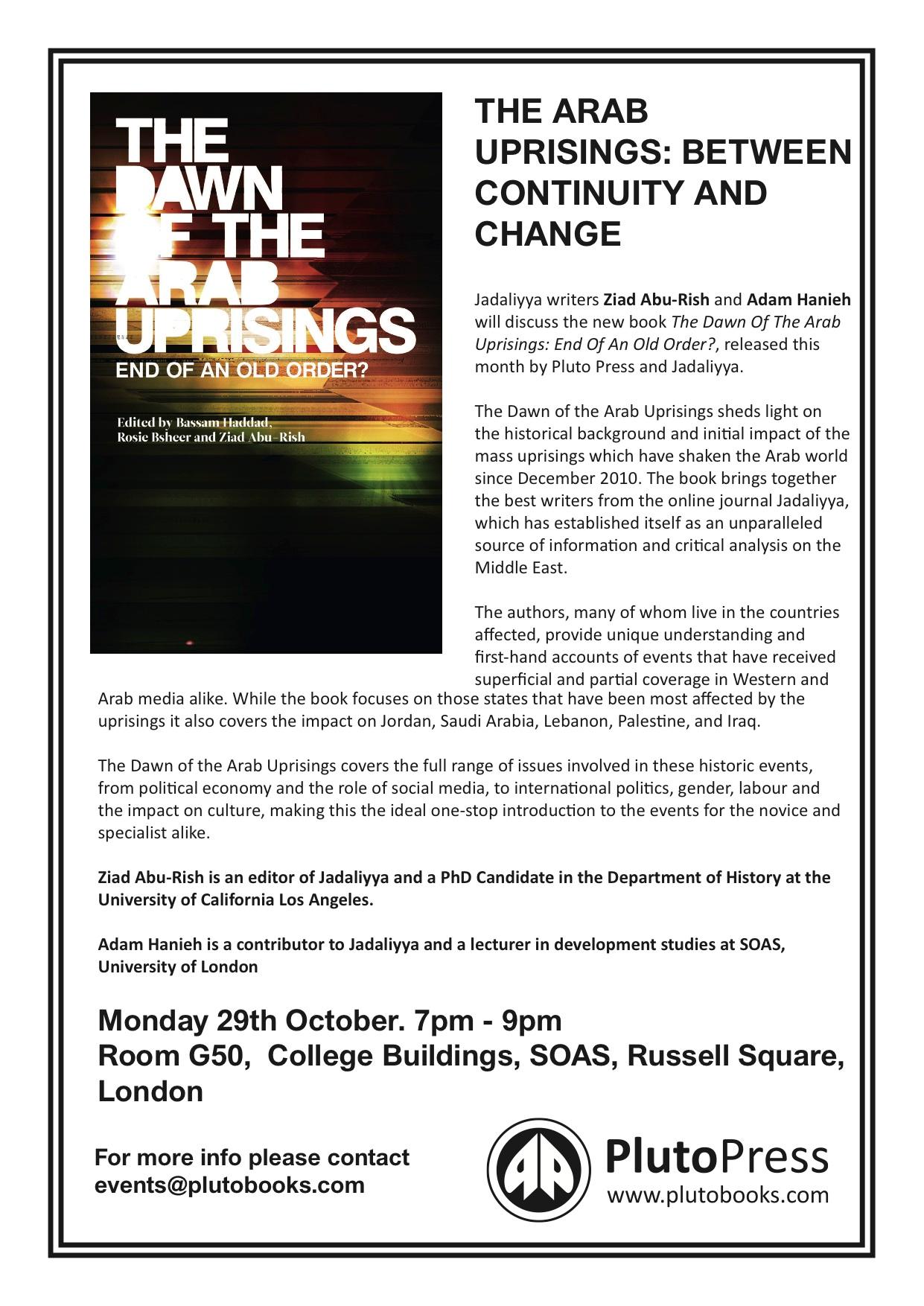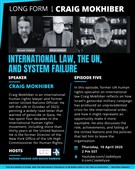[This event has already occured. Click here to read Naira Antoun`s review of both the event and the book in Egypt Independent.]
Panel Discussion and Book Launch Event
This event marks the release of Jadaliyya`s first book, which is published by Pluto Press. The panel features one of the volume`s co-editors (Ziad Abu-Rish) as well as one of its contributors (Adam Hanieh). The panelists will offer commentary on both the book (as a resource) and the general trajectory of the uprisings (as socio-political phenomena).
The Dawn of the Arab Uprisings: End of an Old Order? (Pluto Press, 2012)
Edited by Bassam Haddad, Rosie Bsheer, and Ziad Abu-Rish
Monday, 29 October 2012
7pm
Room G50, College Buildings
School of Oriental and African Studies (SOAS)
Russle Square, London
Panelists
Ziad Abu-Rish is a PhD Candidate in the Department of History at the University of California Los Angeles. He is co-editor of Jadaliyya Ezine, as well as a co-editor and contributor to the volume.
Adam Hanieh is a lecturer in the Department of Development Studies at the School of Oriental and African Studies, University of London. He is a contributor to Jadaliyya Ezine and is featured in the volume.
About the Book
The Dawn of the Arab Uprisings sheds light on the historical context and initial impact of the mass uprisings that have shaken the Arab world since December 2010. The volume documents the first nine months of the Arab uprisings and explains the backgrounds and trajectories of these popular movements and regime strategies to contain them. It provides critical analysis and at times first-hand accounts of events that have received little or superficial coverage in Western and Arab media alike. While the book focuses on those states that have been most affected by the uprisings, including Tunisia, Egypt, Bahrain, Libya, Yemen, and Syria, it also covers the impact on Jordan, Saudi Arabia, Morocco, Algeria, Palestine, Lebanon, and Iraq.
As the initial phase of the uprisings subsides, counter-revolution sets in, and grand narratives crystallize, it is important to take note of the diversity of reactions that emanated from activists, scholars, and others as the uprisings were first unfolding. In this sense, the volume archives the realm of possibilities, both imaginative and practical, optimistic and pessimistic, that were opened up as people sought to make sense of the rapidly unfolding events.
Praise for ther Book
As contemporary reflections, these writings capture the unfolding of revolutionary events as they happened and convey the uncertainties, hopes and disappointments of collective worlds being remade. As the work of scholars and activists with a rich knowledge of the region`s histories and political aspirations, the essays offer lasting insights into the forces shaping a new moment in world history.
-- Timothy Mitchell, Columbia University
During the Arab uprisings, my first port of call every day was Jadaliyya to understand and interpret the events. The articles collected here are a very rare combination - scholarly but also accessible for a broad public. This book will be a much-treasured volume for undergraduate students, and its sophistication will also benefit postgraduates and academics. More importantly, an intelligent lay reader will also find the book immediately useful.
-- Laleh Khalili, Senior Lecturer in Middle East Politics, SOAS, University of London
A primer of importance not only to students of the “Arab spring,” but also to those concerned with protest more generally. Registering both the exhilarating optimism and crushing disappointment of contemporary political life, this volume gives voice to some of the possibilities for and impasses to political transformation.
-- Lisa Wedeen, Professor of Political Science, The University of Chicago
Jadaliyya has established itself as an indispensable source dealing with the contemporary Arab world. This collection of its pieces on the Arab uprisings is perhaps the best introduction to the political movements that have shaken that region since January 2011. It represents a set of intelligent commentaries on revolutionary events in almost every Arab country, and their repercussions in the area generally and beyond. Essential reading.
-- Talal Asad, City University of New York
The outburst of the Arab Revolutions demands imaginative and novel perspectives on the Arab world, and Jadaliyya has managed to provide a unique forum covering the region with a fresh approach to its issues and problems. Its talented contributors, from the Arab world and beyond, combine objectivity with a progressive, humanistic engagement, and never shy away from sometimes explosive topics. Necessary reading.-- Fawwaz Traboulsi, author of A History of Modern Lebanon

![[Image crop from event flyer]](https://kms.jadaliyya.com/Images/357x383xo/bookevent.jpg)

















